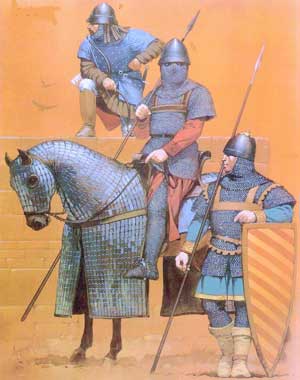
Battle of Tarsus |
year: 96516 August 965 |
| The Byzantines captured the city and started an invasion into Syria | ★ ★ ★ ★ ★ |
|
enemy: Arabs (Hamdanids)
|
location: Tarsus in Mersin province in southern Asia Minor
|
accuracy:
●●●●●
|
|
battle type: City Capture |
war: Later Byzantine-Muslim Wars |
modern country:
Turkey |
| ▼ The Byzantines(emperor: Nikephoros II Phokas) | ▼ The Enemies | |
| Commander: | Emperor Nikephoros Phokas | Unknown |
| Forces: | 40,000 | Unknown |
| Losses: |
| Background story: |
| In the spring of 964, as emperor, Nikephoros II Phokas started a huge campaign aiming at a final blow against Arabs who continued to devastate the Christian cities of Cilicia and Cappadocia. The departure of the emperor from Constantinople leading his 40,000-strong army, was celebrated as the beginning of a “Holy War”. Along the march, more and more fighters joined. In July 964, the Greek army passed through the famous Ciliceae Pylae (Cilician Gates), taking by storm more than 20 fortresses and, among others, the city of Adana. Phokas then marched east to besiege the key fortress of Tarsus in Cilicia, held for Sayf ad-Dawlah, Emir of Aleppo. The city was the birthplace of Saint Paul and had become a base of operations for the regular summer raids into Byzantine lands through the Cilician Gates when the mountain snows had melted and passage was possible. In 964 was not well prepared to continue the siege of Tarsus but he spent the winter in Cappadokia and resumed his efforts next spring. |
The Battle: |
 Byzantine warriors In Tarsus, in front of the city walls, the Byzantines beheaded 100 lords from Mopsuestia whom they had taken with for this very purpose. In response, Tarsus defenders slaughtered 3,000 Byzantine prisoners on the spot. However, the people of Tarsus, after the first attacks, discouraged by the lack of supplies and without any hope for help from Emir Al-Daula, decided to negotiate and asked Phokas for the aman. The emperor agreed and the city was surrendered on August 25, 965. The Byzantines strictly complied with the terms of the agreement and allowed the inhabitants to leave. |
Noteworthy: |
| An additional reason that Phokas insisted on Tarsus was that the city was the birthplace of the Apostle Paul. Phokas, like many other Byzantine generals, attached great importance to such religious (and non-religious) semantics that improved his public image. |
Aftermath: |
| After Tarsus and Mopsuestia, and as the Arabs evacuated Cilicia in panic, the road was now open for Antioch and Syria. Tarsus remained Byzantine for almost a century. |
|
|
